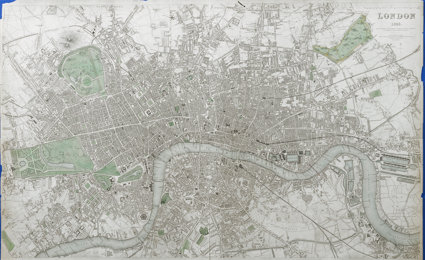
Those who would like a license to operate as licensed taxi drivers in London in a ‘black cab’ need to do the knowledge. There are usually several thousand people going through the process, the vast majority of them being men. They must pass a number of assessments before getting the ‘Green Badge’.
They need to know every street within a six-mile radius of the centre of London, and also know routes between specific locations.
For further information, the National Geographic wrote a feature article (08/08/14) about the knowledge, which has some great maps and an illustrated essay on the knowledge.
Being a cab driver in London is not a new job: Oliver Cromwell granted a charter for Hackney carriages in the city in 1650. The idea of learning ‘the Knowledge of London’ was introduced in 1850.
This unit will involve showing an appreciation of a small area of London, and recreating it in some way. This should include some aspect of ‘navigation’, but also a creative task which draws on a range of geographical skills, perhaps involving ‘rediscovering some local geography’ e.g. uncovering a lost story from the local area, talking to elderly residents of a different generation, creating a map in unusual format or materials, or capturing it in a photo-essay.
This could also perhaps be based on fieldwork for those schools in London that have the opportunity to do this in their local area. This would be preferable to a classroom-based process, but may not be possible for many teachers using this unit, although you could, of course, base it in an urban area closer to your location.
Involving a London cabbie in the process would also add another dimension to the task, as well as being an interesting person to speak to students.
Stimulus task if required
Read about Noelle Poulson’s CongestionZone project, where she walked every road in Central London.
Go to the Londonist website - this mirrors earlier work that was apparently done by Phyllis Pearsall as she was preparing her maps for the famous London A-Z, although there are doubts that she actually walked all the streets she mapped. By doing this project, Noelle says that she got to know London better than any other way.
Starter
Quick Quiz on Taxi Driver slang
Taxi drivers have a slang term for quite a few locations within London
e.g. ‘Hot and cold corner’ – Royal Geographical Society (has statues of David Livingstone and Sir Ernest Shackleton)
Match these places to their slang terms
A Flyer Buckingham Palace 1
B The gasworks Natural History Museum 2
C The Bindi Heathrow Airport 3
D Buck house The London Eye 4
E The Dead Zoo Houses of Parliament 5
Answers: A3, B5, C4, D1, E2
Can you find (or invent) some other terms that are used as slang or shorthand for common taxi destinations within London?
Main Activity
Choose an area of London that you are going to find out about, and recreate in the form of a map.
One option that you can choose is to create a map that proves you know London ‘like the back of your hand’.
Choose a format for your local map, and identify an appropriate mapping tool or media to use.
-
Photo Story
-
Back of the hand map – mirroring the phrase ‘I know this place like the back of my hand…’ – see Back of my hand (PPT) for further instructions
-
Map – made using collaged maps and text, or scope for using Digimap for Schools if your school has a subscription to the service
-
StoryMap – this is a new type of map made possible using ArcGIS Online and an app called Snap2Map which makes the process very easy – this is FREE for iPhone and Android
-
3D map – could build up the texture using kitchen roll and PVA, or papier-mâché
Mark Scheme
We will leave this for you to decide, but the basic idea to keep the analogy of the taxi driver is that the students are trying to win their ‘Green badge’.
We would suggest that you should reward students who demonstrate some of these qualities in their work:
Imagination
Creativity
Accuracy
Choice of base map
Selection of data that has been plotted
Use of images and other media
Quality of ‘storytelling’
Plenary
Peer assessment of the maps that have been created, and addition to map display.
There may be opportunities to connect the work with an entry for the RGS-IBG’s Young Geographer of the Year competition.
Check the details to find out the question and format that is being asked for at the time when you complete this unit.
Final comments on the unit made using the MapTweets document or other format.
If you are teaching in London, it may be worth trying to connect with another school to ‘swap’ maps.
File nameFiles
File type
Size
Download
